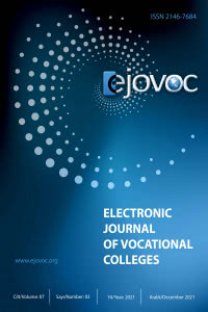İKTİSAT EĞİTİMİNİN TEMEL SORUNLARI VE ÇÖZÜM ÖNERİLERİ: ADIYAMAN ÜNİVESİTESİ ÜZERİNE BİR UYGULAMA
İktisat bilimi, insanların çeşitli malları üretmek ve bunları tüketmek için toplumun tüm üyelerine dağıtmaya yönelik kıt ya da sınırlı üretim kaynaklarını ne şekilde kullandıklarını kapsar. İktisat biliminin olgunluk düzeyine ulaşması çok eskilere dayanmamaktadır. Her ne kadar Fransa’da ilk ekonomi politik kürsüsünün kurulması 1820’li yıllara rastlasa da o dönemde iktisat henüz hukukun yardımcı disiplini konumundaydı. 2000’li yıllara gelindiğinde ise iktisat bilimi her dönem değişik paradigmalardan geçmiş ve her zaman yaşadığı dönemin karakteristik özelliklerine sahip çıkmıştır. Son dönemde egemen düşünce Neo-Klasik iktisat olup, bu öğretinin de geleceği sosyal ihtiyaçlardan dolayı sorgulanmaktadır. Üniversitelerde okutulan iktisat derslerinde öncelikli olarak güncel ekonomik olayları anlamak ve açıklamak, geleceği tahmin etmek ve olayları kontrol ederek yönlendirmek hedefleri vardır. Fakat son dönemlerde iktisat bilimi ve eğitiminin toplumsal hayattan gittikçe uzaklaşması sorunlara çözüm bulmada çaresizlikler yaratmaktadır. Çalışmada iktisat eğitiminde yaşanılan bu sorunlar incelenirken, iktisat eğitiminin bilimselliği ve sorunları irdelendikten sonra Adıyaman Üniversitesi’nde, iktisat eğitiminin sorunlarını tespit etmeye yönelik, iktisat dersi almış 351 kişiye anket yapılmıştır. Elde edilen verilerin analizi SPSS 15.0 for Windows istatistik programı çerçevesinde frekans ve ortalamalar kullanılarak yorumlanmıştır
Anahtar Kelimeler:
Ekonomi, Eğitim, Üniversite, Bilim
THE BASIC PROBLEMS AND SOLUTION PROPOSALS OF ECONOMICS EDUCATION: AN APPLICATION ON ADIYAMAN UNIVERSITY
Economics, as a science, studies production of goods and how it is consumed by members of society and how the limited resources are shared amongst them. The maturity of Economics as a subject of science doesn't date back to very old times. Although the first establishment of Political Economics chair in France goes back to 1820s, Economics was only a complementary discipline of Law at that time. Whereas when we came to 2000s, Economic Science has passed through many different paradigms at different periods and always adopted the characteristics of the period that it was living in. Recently, dominant school of thought is Neo-classic Economics, but the future of this doctrine is also being questioned with respect to social needs. The Economics courses thought at the universities have the primary targets of understanding and explaining the contemporary economic activities, predicting the future and directing the events by controlling them. However recently the Economics Science and teaching drifting away from the realities of social life and therefore it lacks the means of finding solutions to problems. In this work, the problems faced while teaching of Economics are analysed, scientific aspects of Economics teaching and its problems are investigated in detail. Afterwards, in order to identify the problems of Economics teaching in Adıyaman Univesity, a survey is done on 351 people who have taken Economics courses. The analysis and interpretation of the resulting data is done via SPSS 15.0 for Windows statistics software by using frequency and medians
Keywords:
Economics, Education, University, Science,
___
- Acar G.T.(2008). İktisadı Değiştirmek. İstanbul: İletişim Yayınları.
- Ardıç, K. (2001). Türkiye’de İktisat Öğretimi Nasıl Olmalı?. İktisat Dergisi, 415, 26-27.
- Aslan, Z. (2006). Üniversitelerde İktisat Eğitimi Üzerine Bir Araştırma: Değişim Gerekli mi? http://www.baskent.edu.tr/˜kokdemir/courses/isle541/tools/ornekrapor.doc 14.02.2013 tarihinde alınmıştır. adresinden
- Buğra, A. (2003). İktisat Siyasete Karşı. Toplum ve Bilim, 95, 23-24.
- Buğra, A. (2011). İktisatçılar ve İnsanlar. İstanbul: İletişim Yayınları
- Colander, D. (2005). What Economists Teach and What Economists Do. Journal of Economic Education, 36, 249.
- Çakır, C. (2004). Türkiye’de İktisat Eğitimi: Tarihsel Bir Perspektif. I. Uluslararası İktisat Eğitimi Konferansı, Bildiri Özeti, Fatih Üniversitesi, İstanbul.
- Gürkaynak, R. ve Güven, A.B. (2003), İktisat ve Toplum Bilimleri: Bir Katolik Evliliğinden Kenar Notları. Toplum ve Bilim,95, 11.
- İzdeş, Ö. (2001). Nasıl Bir İktisat Eğitimi?. İktisat Dergisi, 415, 40.
- Jevons, W.S. (1905). The Principles of Economics. New York: A.M.Kelley.
- Kazgan, G. (2006). İktisat ve Etik. http://kazgan.bilgi.edu.tr/docs/iktisat_ve_Etik.doc adresinden 10.01.2013 tarihinde alınmıştır.
- Keynes, J.N. (1891). The Scope and Method of Political Economy, New York: Kelley and Millman.
- Koeva, S. and Yakimova, I. (1998). Transforming Economic Teachin in Bulgaria: A Difficult Transformation. Journal of Economic Education, 29, 88.
- Marshall, A. (1890). Principles of Economics. London: MacMillan.
- Robbins, L. (1932). An Essay on the Nature and Significance of Economic Science. London: MacMilan.
- Ruben, E. B. (2001). İktisat Öğretiminin Sorunları. İktisat Dergisi, 415, 35-36.
- Sarfati, M. (2001). İktisat Bilimi Üzerine Tartışma. İktisat Dergisi, 415, 5-7.
- Savaş, V. F. (2007). Varsayalım ki İktisat. Ankara: Nobel Yayın.
- Sayan, S. (1994). Türkiye’de İktisat Öğretimi Nasıl Yapılmalı? Bir Mikroiktisadi Yaklaşım Denemesi. Ekonomik Yaklaşım, Cilt:5, 14.
- Schumpeter, J.A. (1954). History of Economic Analysis. New York: Oxford University Press.
- Şimşek, S. ve Cicioğlu, Ş. (2006). İktisat Eğitiminde Temel Sorunlar ve Öneriler. THİS, Cilt 20, 3.
- ISSN: 2146-7684
- Yayın Aralığı: Yılda 2 Sayı
- Başlangıç: 2011
- Yayıncı: Kırklareli Üniversitesi
Sayıdaki Diğer Makaleler
TARİHSEL SÜREÇ İÇERİSİNDE COĞRAFİ, SİYASİ VE İDARİ BİR TERİM OLARAK “RUMELİ” (12.-19. YÜZYILLARDA)
Gülay Özaltin TÜRKER, Ali TÜRKER
ÖNLİSANS ÖĞRENCİLERİNİN GİRİŞİMCİLİK ÖZELLİKLERİNİ VE EĞİLİMLERİNİ BELİRLEMEYE YÖNELİK BİR ARAŞTIRMA
BÜTÇELEMEDE DEMOKRATİK BİR DEĞİŞİM: KATILIMCI BÜTÇELEME
Süreyya SAKINÇ, Sibel Aybarç BURSALIOĞLU
FARKLI KARİYER EVRELERİNDE OLAN ÖĞRETMENLERİN ÖĞRENCİLERİN KARİYER GELİŞİMLERİNE İLİŞKİN GÖRÜŞLERİ
Ali DERAN, İncilay SAVAŞ, Emine FIRAT
İKTİSAT EĞİTİMİNİN TEMEL SORUNLARI VE ÇÖZÜM ÖNERİLERİ: ADIYAMAN ÜNİVESİTESİ ÜZERİNE BİR UYGULAMA
SİVAS’TA YETİŞEN SALVİASP. (ADAÇAYI) BİTKİSİNDEN ELDE EDİLEN RENKLER VE HASLIK DEĞERLERİ
